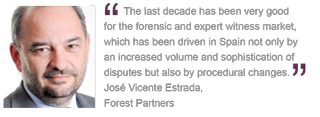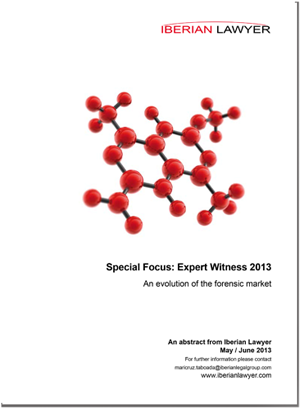Special Focus: Expert Witness 2013: An evolution of the forensic market
The downturn has helped drive a dramatic rise in demand for forensic and expert witness expertise, and as the market evolves, it is also becoming more sophisticated and stratified.
A perhaps inevitable consequence of the economic downturn is a sharp rise in disputes among companies, shareholders and government entities, as parties look to enforce current agreements. “Commercial disputes have been increasing in Spain,” says Fernando Cuñado, Madrid-based Head of KPMG Forensic, “especially for matters tied to the financial crisis”.
In addition, as companies look to balance a drop in domestic growth with new opportunities on offer beyond Iberia, many more businesses have found themselves in dispute with local partners, agents and even governments.
“We are seeing a rise particularly in international commercial and investment arbitrations,” says Juan Jesús Valderas, Madrid-based EMEA Head of Forensic Services at Deloitte. “Companies want to quantify losses, determine quantum and dispute the figures claimed by opposing parties in what are very often complex multi-faceted, and even-multi-party disputes.”
 The capital gains
The capital gains
This upturn has certainly been welcomed by law firms, with most reporting rising demand for litigation and arbitration expertise since 2008. But such developments have also prompted significant growth in an already fast-evolving forensic and expert witness expertise market, with Madrid emerging as a centre not only for Spanish issues but where two of the largest players in the market, KPMG and Deloitte, for example, now co-ordinate their Europe, Middle East and Africa (EMEA) forensic practices.
The Spanish capital is now a focus not only for Iberian business sectors such as banking and insurance but also the leading domestic regulatory bodies – especially as the process of regulatory convergence gathers pace – and many of the most prominent Iberian litigation and arbitration law firm practices.
“The downturn has driven a significant upturn in demand from clients – particularly law firms – but I get a sense that there is more growth to come,” says Valderas. The collapse of the cajas and issues around directors’ duties and liabilities and mis-selling of financial products has driven a lot of domestic litigation but he now senses more companies in the wider economy are willing to enforce their rights, if it will put them in a stronger competitive position at the outcome.
All the Big Four audit firms have strong forensic capability in the Capital, and some in Barcelona. But alongside the likes of established players like KPMG, Deloitte, Ernst & Young and PwC, a new wave of firms are perceived as increasingly prominent, among them BDO, Forest Partners and Accuracy.
In addition, Spain is now seeing the growth of international players including FTI Consulting, Protiviti and RSM Grasso. Although at the top end of the market, the pool of leading practitioners remains relatively shallow. 
“The last decade has been very good for the forensic and expert witness market, which has been driven in Spain not only by an increased volume and sophistication of disputes but also by procedural changes,” says José Vicente Estrada, a Founding Partner at Forest Partners, and previous Head of Forensic at KPMG. “In domestic litigation, there is now more emphasis on oral evidence than written submissions, while successive Arbitration Acts have greatly increased the perception of the process as a credible means of resolving disputes at home and especially abroad.”
Different approaches
As well as a rise in the relative size of practices, growing demand is prompting increased sophistication and stratification of the market, say practitioners. KPMG and Deloitte continue to have the largest practices, closely followed by Ernst & Young and PwC. But capitalising on rising demand, especially at home, are the other major audit firms, such as BDO.
The major audit firms are all looking to deepen their capabilities and market profiles, says Javier Espel Sesé, who leads BDO’s Forensic Group in Madrid. At BDO, the current focus is on expanding the profile among domestic arbitrators and arbitration chambers. Their operational structure allows them to draw on the firm’s entire forensic network. A typical project team includes a leader, a forensic manager, senior assistants and colleagues from BDO’s different business teams, that perform the project, prepare the report and provide evidence in the Arbitration procedure or in Court.
Accuracy, for example, originally established by ex-Arthur Andersen partners, adopts a slightly different approach as they do not operate any other audit or regulated businesses, unlike the major audit companies. Around 30 percent of the firm’s activity is focused on disputes and 40 percent on transactional issues, says Eduard Saura, Managing Partner in Spain. The remainder split between assisting companies in the decision-making and working on distressed company issues.
Different offices have a tradition of involvement in different sectors – the Madrid office has a track record in infrastructure, oil and gas, transport and financial issues – but the spread of work type across plays a key role in how the forensic teams operate, he says. “We think that the ability to look at disputes in a rounded way is important. Having helped to structure transactions means you better understand how valuations are made, what issues may arise out or turnkey agreements or earn-outs, what the ROI expectations may be, and even what warranties might have been made.”
Sophisticated needs
Even with a growing number of players in the market, the rise in the volume of disputes, coupled with the growth in size of teams within the major firms, means that conflict issues may play an important factor in who acts on any one matters, say many.
The creation of Forest Partners is a direct result of Estrada’s desire to reduce his exposure to conflicts, he says, and more than one practice leader at a Big Four firm stated off the record that the firm is now their preferred alternative first port of call.
For Valderas at Deloitte, the emergence of new players in the market is a welcome and necessary development. The growth of new firms is an inevitable part of an evolving and expanding market. “Competition is not a problem. The market needs a large number of very capable operators if we are all to grow our capabilities and expertise.” 
However, the major challenge facing the forensic practices, big and small, is often to deliver the depth of expertise required. The law firm clients of most are very sophisticated buyers of professional services, and in the heat of a tribunal it can become apparent very quickly if the figures do not add up, or if an expert witness is not able to sufficiently defend their findings.
“In theory all the major players can put together a decent analysis but the differentiator is how robustly you can defend your findings under cross-examination,” says Espel Sesé at BDO. “There is no real cost difference in producing a report for a domestic or international dispute, but the real value comes in how and where we present and defend our findings.”
Espera agrees that experts’ fees inevitably reflect the scale and complexity of the matter, and this is especially true for the still relatively limited pool of senior Madrid-based practitioners able to operate in the international arbitration arena.
“Law firms have experienced a greater demand from clients for fixed or success fees but they still want the very best experts on their side,” says Espera. “And when it comes to very complex disputes or where the most senior executives are on trial, there is even greater emphasis on securing the best people in the market.”
There may be signs that in Spain at least the economy may be finally turning a corner but the boom in disputes is far from over, say others – and the forensic business is not quite counter-cyclical.
“We get the sense that as the economy bottoms-out, more companies are reassessing the types of disputes they engage in,” says Valderas at Deloitte. “With light at the end of the tunnel, more businesses are less concerned with mere survival and more focused on winning back their market positions – which includes committing significant capital to pursue disputes that may go on for many years.”
The majority therefore predict that demand will continue to rise and while there is fee pressure, particularly on smaller domestic matters, the cost of forensic and expert witnesses is only ever a small, but very necessary, part of the overall costs of a dispute. Forensic practices have to be alive to the costs issue, but there is much less sensitivity in a dispute valued at €100m to one valued at €1m.
Once you cut fees, however, it is much more difficult to increase them. Inevitably the forensic and legal practices best placed to capitalise on the upturn, not only in the volume of disputes, but also a rise in the most complex cross-border cases, will be those that have continued to invest in deepening their international reach and capabilities.












